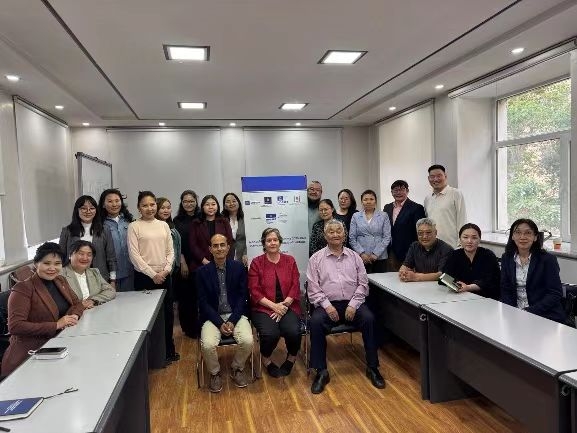| News | Capacity Building for the Mongolia Heritage Programme held in Ulaanbaatar |
| PublishDate:2025-06-23 Hits:2139 |
Group Photo From June 16 to 20, 2025, Component 1 of the Mongolia Heritage Programme (MHP 2025–2026) was successfully undertaken at the School of Culture, of the National University of Arts and Culture of Mongolia, in Ulaanbaatar, Mongolia. The programme is implemented through a strategic partnership between the the UNESCO Regional Office for East Asia, the Ministry of Culture, Sports, Tourism and Youth of Mongolia, the Mongolian National University of Arts and Culture, and the Mongolian National Commission for UNESCO and supported by WHITR-AP Shanghai. Ms. Carolina Castellanos, Head of Research Unit, WHITR-AP Shanghai, designed and lectured extensively in the workshop, while 18 participants from Mongolia attended. The MHP represents a collaborative and capacity-driven response to Mongolia’s growing need for skilled heritage professionals. It has been conceived as a comprehensive framework to support cultural, tangible and intangible, and natural heritage management and emphasizes integration with international best practices while rooting learning within local and national contexts. Component 1 marks the first phase of a two-year initiative aimed at delivering targeted capacity building and ultimately laying the groundwork for a dedicated academic degree in heritage management. Component 1 was designed as an intensive, in-person training module, preceded by a one-day online orientation. The module introduced participants to essential knowledge areas and practical methodologies in heritage identification, protection, safeguarding, and sustainable management. Content was delivered through five thematic modules: Introduction to Heritage, Legal Frameworks, Heritage Protection and Safeguarding, Heritage and Sustainable Development, and Challenges and Future Directions. Pedagological approaches combined foundational knowledge delivery with active, participatory learning and peer exchange. They included theoretical presentations, group work, guided thematic discussions, and debriefing sessions, all aimed at encouraging reflection on complex heritage issues and application to real-world challenges.The programme welcomed 18 participants from across Mongolia, who actively contributed to group exercises, shared professional insights, and contextualized global frameworks within local realities. Through interactive sessions, they examined specific challenges in heritage management and identified potential context-sensitive solutions. Component 1 ended with participants articulating their personal action plans—identifying specialization areas and framing their future learning journeys for upcoming MHP components. The success of Component 1 underscores the relevance of modular, practice-oriented capacity development as a scalable model for heritage sector. It offers a replicable framework for institutional partnerships, cross-sectoral knowledge-sharing, and long-term professionalization of heritage management in Mongolia.
Contributed by Carolina Castellanos Designed by Ye Minjun (Intern) Yang Wenhui(Intern) Edited by Liu Zhen Reviewed by Shao Yong |
- Lecture: Preventive Archeology
- New Year Message | UNESCO World Heritage Centre for Training and Research in the Asia and Pacific Region (Shanghai) Extends to You Its Sincere New Year Wishes!
- Review | Cooperation between Xiamen, CNR and WHITR-AP Shanghai
- Review | Yunlong International Workshop on Vernacular Heritage
- Review | The Heritage Educational Landscape Exhibition
- Review | UHC-HEI 1st General Assembly
Copyright © 2009-2012 World Heritage Institute of Training and Research-Asia and Pacific (shanghai)



